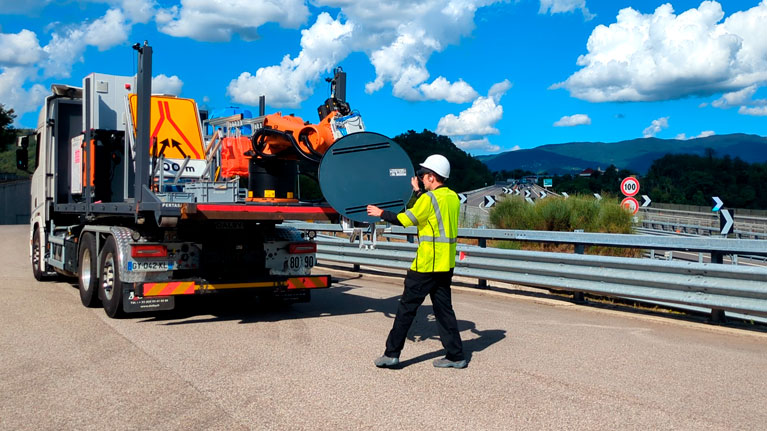Robotic technologies for road maintenance: Validation of prototypes and technological breakthroughs
Aging road infrastructures in Europe require innovative technological solutions to enhance maintenance and guarantee safety. It is in this context that project OMICRON, in which Tekniker has also been involved, has developed advanced robotic technologies to perform smart maintenance interventions on roads. These breakthroughs were presented at a seminar in Madrid entitled "Old Roads, New Technologies".

Roads are essential for our society and our economy as they allow for daily journeys, provide efficient transportation of goods and facilitate other essential activities. As many of Europe’s main roads, built between 1960 and 1970, have exceeded their estimated 50 years of service life they must undergo urgent renewal and maintenance actions. Due to a constant flow of traffic, it is essential to implement technological solutions to speed up these processes and guarantee road workers’ safety.
To achieve this goal, project OMICRON, in which Tekniker is involved, has developed innovative smart management solutions applicable to infrastructures. These developments were presented yesterday during a seminar held in Madrid entitled "Old Roads, New Technologies".
The seminar brought together experts, engineers and other professionals working in this sector to share the outcomes of the project and learn more about the most recent developments reported in the area of robotic technologies applied to road maintenance in Europe.
In terms of the results obtained, the speakers described how tests were run with the first functional prototype based on a modular robotic platform designed to improve road maintenance.
Thanks to this innovative prototype, several maintenance operations were validated under real operating conditions during project OMICRON. One of the most outstanding operations was carried out on the A-7 motorway in Valencia where crack sealant materials and laser paint removal techniques were used which did not only demonstrate the platform’s accuracy and efficiency, but also confirmed its technical feasibility as an innovative solution.
Oher maintenance operations were also carried out and validated such as, for instance, the placement of traffic cones, the cleaning of road signage, the installation of guardrails and placement of temporary signage in the vicinity of the A-1 motorway in Florence. These tasks, which are essential to ensure road safety in work zones and in modified traffic situations, fully demonstrated the versatility and functionality of this robotic technology.
The Madrid seminar provided a perfect scenario for exchanges addressing these significant developments and discussions focused on the future of technologies applied to the conservation and management of road infrastructures in Europe. It is within this framework that the validations performed in real environments have played an outstanding role with regard to developing robotic technologies by opening up new horizons in terms of optimising efficiency, improving safety and enhancing sustainability in the area of road management.
This project has received funding from the European Union’s Horizon 2020 research and innovation programme under grant agreement N°955269.
